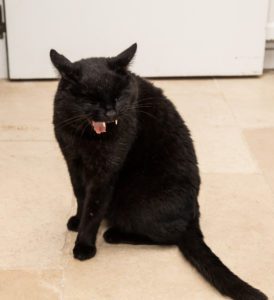If your cat is experiencing some coughing, no need to panic as there are a multitude of factors to consider, as well as fixes for this issue; some may be less expensive than you might expect! Some causes and treatments for your cat’s coughing could be as simple as the type of litter you are using, whether or not it is clay-based, and switching to one that does not irritate their lungs.
However, it is important to always consult your veterinarian in order to properly diagnose and fix the issue at hand. Coughing may be a sign that your cat is experiencing some sickness, which can be easily and swiftly treated by a prescription by your vet. It is important to evaluate all of the environmental factors before jumping to conclusions. If you have any questions, feel free to call Bayshore Veterinary Hospital in Holmdel, NJ at (732) 671-3110.

Irritants
Some cats may experience coughing due to irritants like hairballs, pollution, and other free particles living about the house. It is important to maintain a clean, dust-free environment for your pet to prevent any congestion and coughing. If coughing does occur, try to clean up your space and enable an area where your cat is free of any loose particles that could cause irritation. Vacuuming often is a good way to prevent coughing for your cat.
Whether you can believe it or not, cats can cough just like humans whenever their space is dust ridden, or dirty. Provide ample cleanliness for your pet to protect the functioning of their lungs.
Clay Based Litter
Clay-based litter can be a secret instigator when it comes to your cat’s breathing. Clay-based litter is an unusually common proponent when it comes to coughing. The tiny clay pieces can easily be inhaled by your cat causing a variety of issues, one of them being a cough. Making the switch not only is a great way to prevent this, but can help your cat overcome the symptom of coughing. Corn litter, pine pellets, newspaper pellets and other alternative litters can be found online, and at your local natural pet supply store.
With advanced technology, you can ensure your cats health and wellness with an alternative-based litter. They are often considered a more sustainable option as well. Alternative litters can clump, much like the common clay variety, but without leading to breathing problems for your feline.
Respiratory Infection
Coughing can be the first sign of a respiratory infection for your cat. Luckily, respiratory infections can be easily treated by your local vet. Medication is available to help ease the symptoms of the infection and help nurse your cat back to full health. Inflammation can cause respiratory infections in your cat’s lungs, which may be present as a cough.
If you hear your cat coughing it is best to monitor the frequency of the symptom and contact your veterinarian if coughing prevails and/or becomes more frequent. Inflammation in the lower respiratory tract may also lead to other infections such as bronchitis, so, be sure to get it taken care of in a timely manner in order to prevent increase in inflammation.
Asthma
Asthma can occur when the lower respiratory tract becomes inflamed. Cigarettes, chemical carpet cleaners, perfumes, mold, hairspray, and a variety of other unnatural airborne substances can potentially cause feline asthma. Coughing has been associated with the listed free radicals in the air so it is best to provide a clean environment that will allow your cat to breathe freely.
If your cat has asthma, they are still able to live happy, active, and full lives. You will need to be sure that any irritants are free from their daily life, and to properly manage any possible triggers.
Heartworm Disease
Your cat’s cough could potentially mean that they have heartworm disease. Symptoms of heartworm disease can be very subtle. Once the heartworm begins reproducing in the feline’s lungs your cat may develop a dry cough. Heartworm can be transmitted by other infected animals, or from mosquito bites carrying infected larvae. Your veterinarian will be able to diagnose your pet with proper tests and clinical signs. Treating heartworm disease can be through the administration of medication, fluid therapy, and other routes that will help your pet get back on the path to proper health.
If your cat is experiencing a cough, no need to panic. There are several different factors and causes that don’t always necessarily lead to the worst case scenario. Whereas issues such as heartworm disease, or asthma may be a potential outcome, there are many steps in taking action for your pet’s respiratory health.
Cleanliness of you and your pet’s space is key in preventing respiratory disturbances. Any odors, irritants, and particles such as dust and small objects can influence your cat’s lungs. This may cause coughing; once the cough is present you may want to reevaluate your pet’s living quarters and the tidiness of it. Clay litter can also be a factor in respiratory issues. Some cats are particular when it comes to their litter and lung health and are prone to getting a respiratory infection due to the dusty nature of clay litter. Try making a switch if your cat is experiencing a cough.
If your cat continues with symptoms, be sure to schedule a visit with your Holmdel vet. They will help diagnose and treat any issues your pet may be having. With medication and preventative measures, your cat will be feeling better in no time. It is important to consult your pet doctor when new behaviors occur in your pets daily routine. A simple cough can lead to more serious issues if left untreated. Heartworm disease and other complications are not to be feared, and can be combated with proper medication and veterinary guidance.
The best thing to do for your feline is to maintain a clean, and irritant-free living space, and to monitor any signs of disturbances like coughing. Consider all factors before assuming the worst! With advancements in pet care technology, diagnosis and treatments are just a visit to the vet away.
